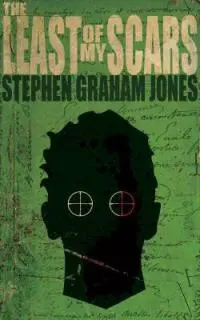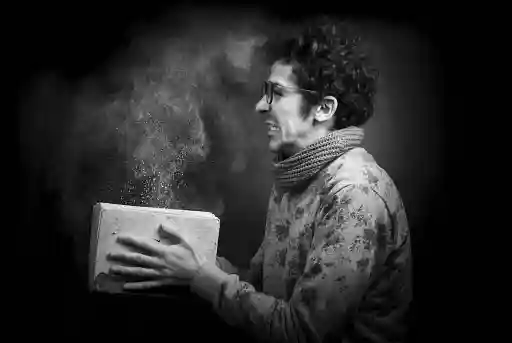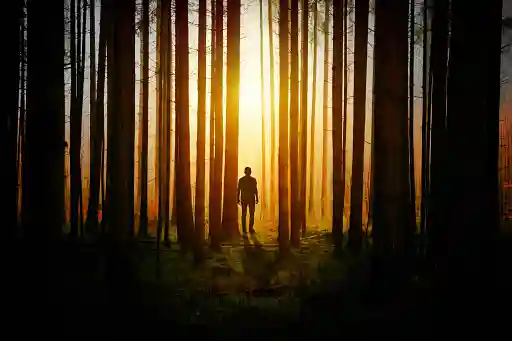Photo via Wikipedia Commons
All my The Least of My Scars drafts and notes have, until a few months ago, been in a directory called “doors.” All the early drafts are that: “doors,” “doors2,” “doors21,” “doors21b,” and on and on, a whole stack of versions and tries and misfires. My original idea was to build every chapter on a knock-knock joke somehow. And calling the novel “Doors” was supposed to play into that. We’re talking eight weeks in 2008, I think it was. I’d just written a draft of The Gospel of Z, which failed and failed hard, and was pretty sure I’d just been fooling myself I was a writer.
 Some of the other titles that tried to happen:
Some of the other titles that tried to happen:
- This House of Rest
- The Wrong End of the Night (is this a Springsteen lyric?)
- The Girl with the Unbreakable Heart
- Dashboard Mary (I thought this was a song. Is it?)
- Hell is Full of People
- These Cheshire Arms
- Here Come the Jesters (flying my BadCo flag)
- Every Little Crack
- Pale Young Four Toes
But then I stumbled into that parenthetical that held the title, and it stuck. Was a lucky find. They all are. They always are. The titles you have to work for and squint to apply, they never quite fit, do they? The trick is getting into that mode of title-receptivity. Which sucks, as it means being tuned into every single thing for days and weeks on end, until the in-rush of possibilities makes your mind start to melt.
At which point you write yourself into a glass box suspended in an underground bunker, watching Hannah Montana.
As for how I ended up there: two or three years before Scars, I’d written this other novel, The Dog Mother (“Interstate Love Affair” in Three Miles Past is part one of The Dog Mother), which, again, was me bottoming out fiction-wise, being pretty sure I didn't have what it took, so, as a fond farewell to it all, and because of course nobody was watching, I thought I'd see how far I could go. Or, how far I shouldn't go. I lost fifteen pounds writing that novel, because it made me sick every time I sat down in front of it. But Dog Mother is finally kind of unwieldy; I’ve never gone back in, tried to lean it down, make it work, and I don't think I've found the exact perfect ending for it yet. Some of those scenes in it, though, man. There’s this dude Nachbar, who beats up this gentleman kickboxer Jordan Anchordiqui, and it was pretty uncomfortable even writing it, Nachbar goes so far. My agent asked me about that scene, asked if I really wanted it out there in the world. I said I did, yes, but then we never sent that novel out. Not because of that scene, but because the novel just doesn’t really work yet. And, feel like a failure all you want, of course, but don't put a stamp on it.
However. Dog Mother kind of gave me a taste for that kind of stuff. Or, no: it made me realize that, in writing it, I was coming home in a way. Back in the early 2000s, at Texas Book Festival, I was on a panel with Rick Riordan, of all people. It was a panel on violence (this was pre-Percy Jackson, for him, and, for me, it was like my fourth panel ever). And a question I got, it was why all the violence in my then-novel, All the Beautiful Sinners? At first the question wouldn't even track for me—life is violence, right?—so I just told the truth: lying in bed at night, this is why I can’t sleep. Because I’m thinking about all this brutal stuff, thinking about it in such high resolution that my heart gets beating way too fast to even pretend to sleep. Unless I'm dreaming with my eyes open. I don't know. That story of mine “The Ones Who Got Away?” I’m not the kids in the van in that story; I’m the guy in the house. That story “Solve for X?” “The Fear of Jumping?” from Bleed Into Me? Those were very, very easy stories to write. So easy that I wondered if I should even publish them.
Anyway, so I’d just written a novel that had been way difficult and was a big failure, and I couldn’t figure how to fix it (story of that here), and I also had this violent, broken novel still stinging like a fresh cut, and, in among all them, I'd also written a screenplay, which was also a big a mess. The Quickbread Host. It’s about one dude abducting another dude into his basement for six weeks of non-fun and games. It gets intense down there, too. Intense and fun. Still, the story isn't working yet, and it definitely wasn't working then, so, instead of fixing it, or fixing The Gospel of Z, or making The Dog Mother something that could work, I did what I always do, what I consider rewriting: I wrote a novel that hopefully didn’t make any of those mistakes.
This is also how I 'rewrite' stories, as a lot of you know. When I write one and it sucks, or has broken parts, instead of trying to rehab it for days or weeks or whatever ('months' in relation to a single story is a fancy way of saying 'career suicide'), I just take what I learned from that one and write another, without those mistakes. Isn't this the way Doomsday was built? By tossing him out into the elements time and again, then starting over, lessons learned, DNA altered to compensate? I'm sure there's other ways to do it. I'm also sure I'm not very interested in those ways, as they seem to be borne of fear of running out of ideas. And, I'm terrified, don't get me wrong, but I'm terrified of running out of years, not of running out of ideas.
As for where exactly William Colton Hughes came from: like every character I've done, male or female, young or old, he's just me in a mask. I guess WHC is maybe what you get when the veneer of society is no longer an inhibiting mechanism? When you're just free to be what you want to be? I was lucky to stumble onto that McCarthy epigraph, yeah. For the longest time, that epigraph was Brian Evenson:
I closed my eye and when I opened it again found myself in a long, bright
hallway which I thought was God’s hallway until my vision began to fade
and I realized that it was not a hallway at all —Brian Evenson
Only reason I changed it, really, was that I was using Evenson as the epigraph for another novel I had going at the time. I kind of miss this one now, though. But, with Evenson being kind enough to blurb it, it would have looked funny, him being on the back cover and in the front matter (this is why The Fast Red Road ended up not being dedicated to Gerald Vizenor, too: because FC2 surprised me with a blurb from him).
But, WHC. His name is easy: in 2008 I was living just off a street named “Coalton.” And I didn't want him to have a name inherently flashy, either. Nothing to draw attention, right? Otherwise bystanders would remember he was here, he was there. But, that three-name thing: people are always talking about how serial killers have three names, aren't they? I’ve never understood that kind of shortsightedness. It’s not that they and they alone have three names, it’s that the media uses their middle names so as to associate the least amount of non-serial-killer citizens with them as they can. So, “William Hughes,” I bet there’s a lot of them. But, add a middle name, and there’s maybe just one more of him out there, if that.
Right before I wrote The Least of My Scars, I was having dinner with a lot of people I didn't really know (big fancy house, food that didn't need ketchup), and all this stuff came up: serial killers, and how their interviewed neighbors always say "He seemed so normal." Which, again, I don't see how people can't see through this: of course this is what you say. Otherwise you're complicit, right? Otherwise you should have called the authorities, stopped all this. So, what saying your killer-neighbor was normal is doing is absolving you of any missed heroics, while at the same time elevating that neighbor's ability to 'pass' up and up, kind of increasing the legend. It's a strange, strange dynamic, and I wish people would think about it more instead of just hit the 'accept'-button.
But, also where WHC came from, probably obviously: Henry Lee Lucas. Growing up in West Texas, it seems somebody's always got a Henry Lee Lucas to tell you at a whisper. It makes walking out through the mesquite kind of haunted, as you always suspect you're about to walk up onto some remains.
Also, in 2008 I’d just read VS Ramachandran’s Phantoms in the the Brain (the two things I read the most: brain-science stuff, and early hominid stuff), and was still reeling from it, wanted so bad to see how it could be used in the wrong hands. I just needed to make those hands up. And, as those of you who know Demon Theory probably already picked up on, I really really like Three’s Company. It’s always playing in the background of my head. So, when I pour my head onto the page, there's usually some Jack Tripper there that I can't quite wipe away.
That dry-vac, though: I don’t allow those in my house. They freak me out.
Anyway, the way Scars is now, that’s after a lot of drafts. It’s easy to ramp up the tension in a novel, to ask questions, but, with Scars, answering them took a lot of runs. I found a lot of chutes and escape hatches I could jump in, for the usual kind of ending, but none of them actually escalated or took a chance, they just kind of reinforced. And that’s never enough. If there's not a distinct chance that your ending's failing, then you need to push it harder, and harder again. This is the fault I see in ninety percent of the things I read: no nerve; taking the soft way out.
I should say too that I wrote this kind of in direct response to Jack Ketchum’s The Girl Next Door. So, yes, his blurb was so cool when it came in. Him and Evenson both supporting Scars, man. Too, too lucky. As for Girl, I think I've read it some nine times, now. In 2008, though, I’d only read it two or three. And each time it left me thinking I was timid, that I wasn’t really pushing myself into uncomfortable places, that what I was calling 'horror' was just unicorns and rainbows. That I wasn't really ducking down into the bad places, where the real stuff happens.
So I tried to. And I don't know if I ever will again.
Was talking to James David Osbourne (of Broken River Books) the other day about Scars, and, now that it’s done and out there, now that I’ve got a bit of distance from it, I was able to tell him the real reason I wrote it: it’s for that one moment when William’s watching the wallpaper maybe peel up at the corner. And he realizes there’s shadow-black fingers back there, trying to open up the wall, get through into his room, into his world. When I think about Scars, now, that’s the scene that comes in on automatic, that's the scene that still makes me nervous in a permanent way. And, yeah, I’d read and re-read Johnny the Homicidal Maniac by then, which has a very similar wall, but I wasn’t thinking directly about it, anyway. I don’t think. But, there’s worse influence than JTHM, isn’t there? Though none better.
Talking comic books, too, there's one more influence, one I read right during the writing of this: Alison Bechdel's Fun Home. That chapter she has about her writing reducing itself to strange little symbols, about the magic ways to get through doors, each time I read it it kind of freaks me out, and in the same way Henry from The Red Badge of Courage does, the same way Perry from In Cold Blood does, the same way Patrick Bateman does: it was like Bechdel was taking dictation directly from my head. Like this was secret transcription. Like the side of my skull was suddenly made of glass, and everybody could see in.
It was liberating, I mean, reading that, reading her. It made William's counting something I could say out loud and leave there, instead of going back like I'd always done, and scrubbing it from the page because no one would understand. I think this may have been what JDO hooked into, too. Like minds can find each other in a dark room. We're touching the same things over and over, I mean.
And, the very-very end of Scars, those last lines: in 2008, I’d just moved up here to Boulder. Coming from West Texas, that’s a monster of a change. One different thing I was always tracking from the corner of my eye, too, it was the yoga. I even rented yoga DVDs to try to understand it. I’ve got nothing against it—if I could get over somebody bossing me around about how to breathe, I'd probably even do it (though Rob Roberge says I shouldn't do it because I'm stretchy, can 'win,' and he's probably right)—I’d just never encountered it. Up here, though, every stripmall’s got a yoga studio. And, watching those DVDs, that kind of peaceful namaste-thing they all do at the end, I kept thinking that wouldn’t be a bad way to end a novel, someday, and then I kind of just slipped it into my hip-pocket while no one was looking, too the DVD back to the store, the clerk never knowing that it wasn't all there anymore.
So, Scars: I’d failed at a zombie novel, I’d failed at a torture screenplay, and I’d failed with a serial killer novel. I completely figured this was it for me, that whatever spark I’d had, it was gone, dead, over. So I wrote The Least of My Scars just to prove to myself I still had some juice. That I could still go places I shouldn’t, and come back with a story. And I never even considered that any publisher would be depraved enough to publish it, or that people would actually want to read it, or that it would be any kind of book club selection.
Thanks for proving me wrong. Thanks for coming into the other side of that wallpaper with me. Jack Tripper’s back there. I don't think he’s who he claims to be, though. But he is watching, and waiting, biting his lower lip in like he does because he's so excited.
Knock-knock, goodbye.
Get The Least of My Scars at Bookshop or Amazon

About the author
Stephen Graham Jones has ten novels and more than a hundred and thirty short stories published, and has been teaching fiction for twelve years. 2012 will see at least two more novels from him, then at least one in 2013 and one in 2014, he says, "should the world not have ended by then."
Stephen Graham Jones' recent few books are Zombie Bake-Off, Seven Spanish Angels, It Came from Del Rio, and the Stoker finalist The Ones That Got Away. Next are Growing up Dead in Texas (MP Publishing), Flushboy (Dzanc), and Zombie Sharks with Metal Teeth (Lazy Fascist). The last few anthologies he's in are The Weird, Amazing Stories of the Flying Spaghetti Monster, Creatures, and West of 98. Jones teaches in the MFA program at CU Boulder. More at http://demontheory.net.






